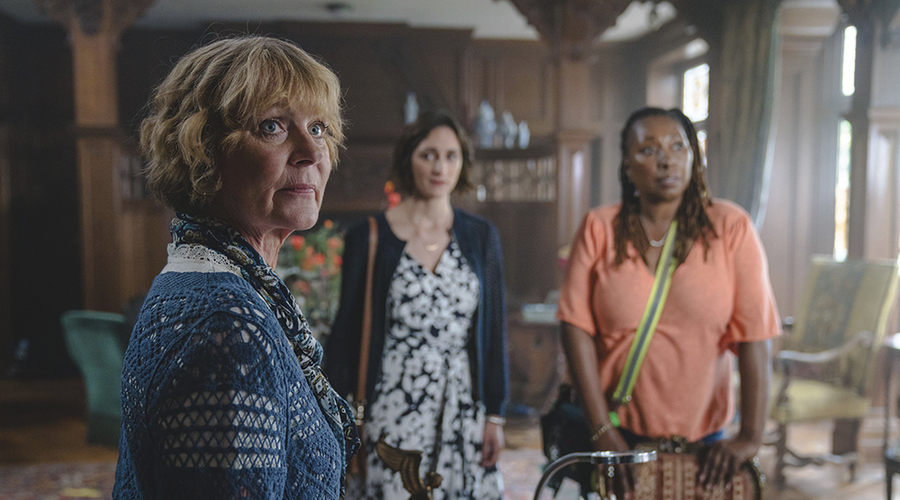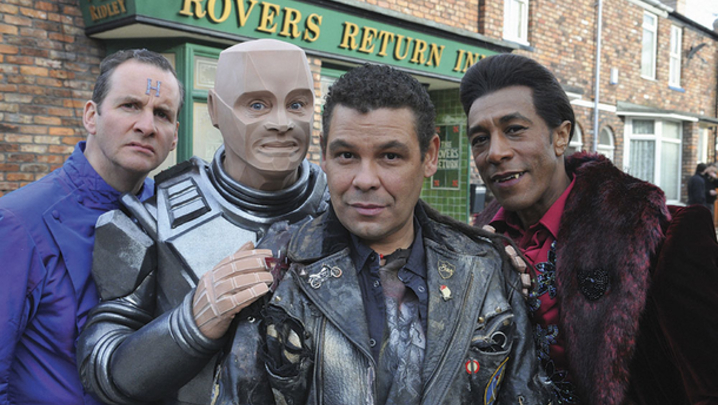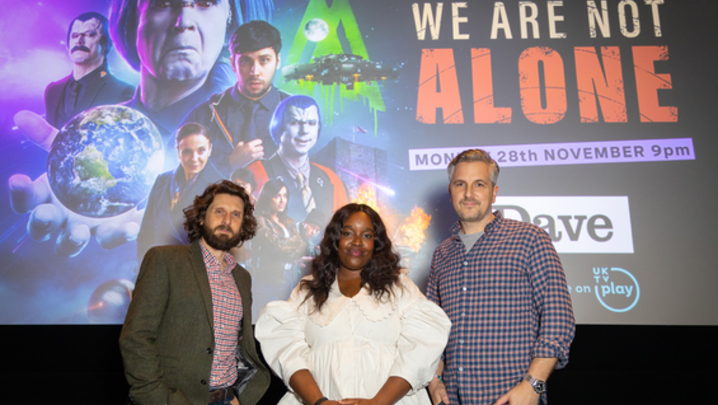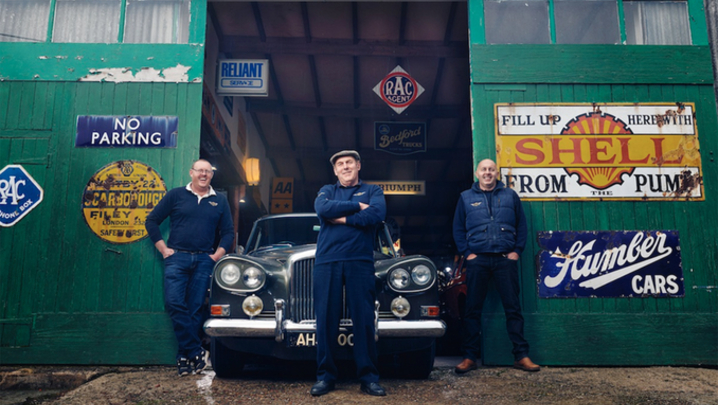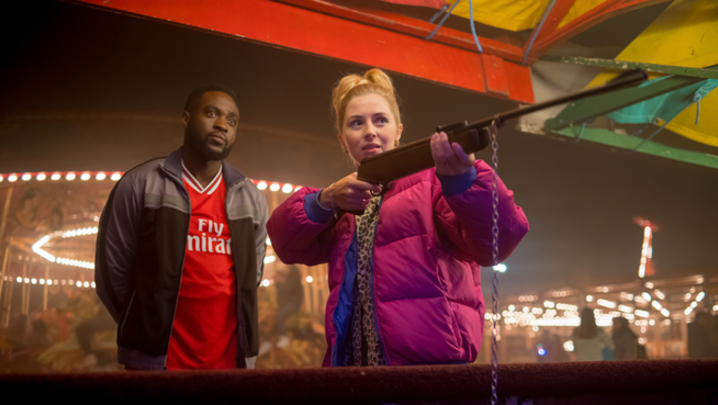Three ordinary women are the unlikely sleuths in UKTV Drama’s first original commission, The Marlow Murder Club. Shilpa Ganatra visits the crime scene
Nefarious goings-on in the genteel Buckinghamshire town of Marlow begin when a much-loved gallery owner is shot dead at his riverside home. So far, so standard for a murder mystery. Things then take an unusual twist when the unlikeliest of trios takes matters into its own hands.
Fronting The Marlow Murder Club, the first original commission from UKTV’s Drama channel, are retiree Judith Potts (Samantha Bond); Becks Starling (Cara Horgan), who, as a vicar’s wife, is defined by her family; and single mum Suzie Harris (Jo Martin, best known for playing an incarnation of the Doctor in Doctor Who), who is contending with becoming an empty nester.
The women are united – and motivated – by the fact that each in their own way is overlooked by society, which makes them a refreshing and atypical focal point for the series.
Over the course of two two-hour episodes, our crime-solving trio scour the Thameside town of Marlow for clues, much to the chagrin of newly promoted Detective Sergeant Tanika Malik (Natalie Dew), who is struggling to command respect at work, while grappling with her busy home life.
“Each of our characters might as well be invisible – we just don’t exist,” says Martin. “To put all of us into the one show, some may say it’s a recipe for disaster, but I think it’s a recipe for success. The last female crimesolving trio I’m aware of was Charlie’s Angels, and they had Bosley [a male private detective] telling them what to do. As well as solving crime, we’re hearing about these women’s lives and desires. It’s not often stories like these are to the fore.”

The women in the series are inspired by the family of Death in Paradise creator Robert Thorogood, who wrote this series and The Marlow Murder Club books on which it is based. “My father was reasonably absent when I was growing up and I was basically raised by my mum, her friends, my great-aunts and my grandmothers,” he says.
“They were all batty, cigarette smoking women who did crosswords and spent the whole day laughing and gossiping. I always got the impression that they were far cleverer than their husbands, who wore suits and had the status. Amazing, proud, independent, brilliant women are so good at leading murder mystery shows.”
The show’s opening scene grabs the audience’s attention. In it, Judith peels off her robe and swims naked in the Thames. Alison Carpenter, executive for Monumental, one of The Marlow Murder Club’s producers, says: “That’s the kind of thing you might not expect to see. Steve Barron, the director, wanted to ensure a modern and sophisticated feel in the way he presented this world.
“I hope that we’ve done that, and created something that feels reminiscent of some of the crime classics, while adding enough of what’s new that feels exciting to watch. All aspects of the production come into play for that: the locations, the production design, the DoP, costumes, make-up.”
In other words, in common with some other recent shows, The Marlow Murder Club brings a contemporary twist to the familiar world of cosy TV crime drama. The Christmas BBC adaptation of Agatha Christie’s Murder Is Easy cast black actor David Jonsson as the lead, while Ashley Jensen brought a youthful dynamism to Agatha Raisin.
Meanwhile, Mrs Sidhu Investigates, another Monumental production airing on Drama, was commissioned for television following years as a popular BBC Radio 4 series.
With The Marlow Murder Club, it is telling that, while it depicts a diverse community, Suzie wasn’t originally a black character; nor is her narrative defined by her colour. Does this indicate to Martin that the acting world is now a more level playing field? “If we think in terms of the disparity in how women are paid and how men are paid, no, it’s not a level playing field,” she answers emphatically.
She adds: “In terms of playing a part not specifically written as a black character, that’s happening to the point where there’s a vibe where some people are thinking: ‘Wait a minute, have I got to be a black lesbian to get a job in this town?’ Which is nonsense. Some people feel they’re being robbed of something, but we just want roles to be shared. That’s it. You can’t be the ones eating all the time, it’s our time to eat, too.”

Martin continues: “Things are improving, and people are striving to do better. We keep learning, we keep trying to educate, and telling all kinds of stories. Even the fact that I did Doctor Who as a middle-aged black woman who wasn’t a size eight is a sign of the times. That would never have happened five or 10 years ago.”
It does seem that more producers accept the need for cosy TV crime that isn’t a historical or period piece to accurately reflect the world around us. Certainly, there is no let up in the popularity of the genre. For starters, Death in Paradise has just begun its 13th – yes, 13th – series. Elsewhere, Midsomer Murders and Vera are still going strong after 27 and 13 years, respectively.
“If you’re into light-hearted murder mysteries, you’re into them year after year,” says Thorogood. “The world is really confusing, bad things are going on and sometimes we want drama to reflect that. But sometimes we want drama to give us the opposite of that. And with the stories I write, someone’s always murdered at the beginning, so the stakes are high, there’s a limited number of suspects and the killer is always caught, so you can tie a knot on the story.”
Aligned with its broad, slightly older demographic, The Marlow Murder Club is a fitting choice as the first original commission for the Drama channel. Hilary Rosen, UKTV’s Director of Commissioning, says: “The first show didn’t need to be a murder mystery, but we have a strong understanding of our audience. And we know it’s an evergreen. Viewers love the redemptive nature of solving crime – good triumphing over evil and bringing villains to justice.”
To provide the show with the budget it needed, US PBS Masterpiece came on board early in the process. It had previously worked with UKTV as co-producer on the Scottish crime drama Annika. Rosen says: “Like all broadcasters, we don’t fully fund dramas and we’re always looking to work with creative partners to ensure that we can bring our shows to screen.”
With luck, The Marlow Murder Club will repeat the success of the books (which have been translated into 15 languages) and become an international best- seller – Thorogood’s plan all along. “When you’re writing, you do think, ‘What’s the poster?’,” he says. “As well as being an authentic writer who wants to exercise his voice and find truth, I also want this to be a big international hit.”
The Marlow Murder Club airs in early March on Drama and will be available to watch on UKTV Play.

